Tag: villages
-
Farmers protest closure of gate blocking them from accessing their land
18th of December, 2015 | International Solidarity Movement, Tulkarm team | Deir al Ghsoon, occupied Palestine Hundreds of farmers protested on the morning of the 18th of December against the closure of an agricultural gate, which led Israeli commanders to agree to reopen the way. In 2002, 3200 dunumns of farmland got cut of from the…

